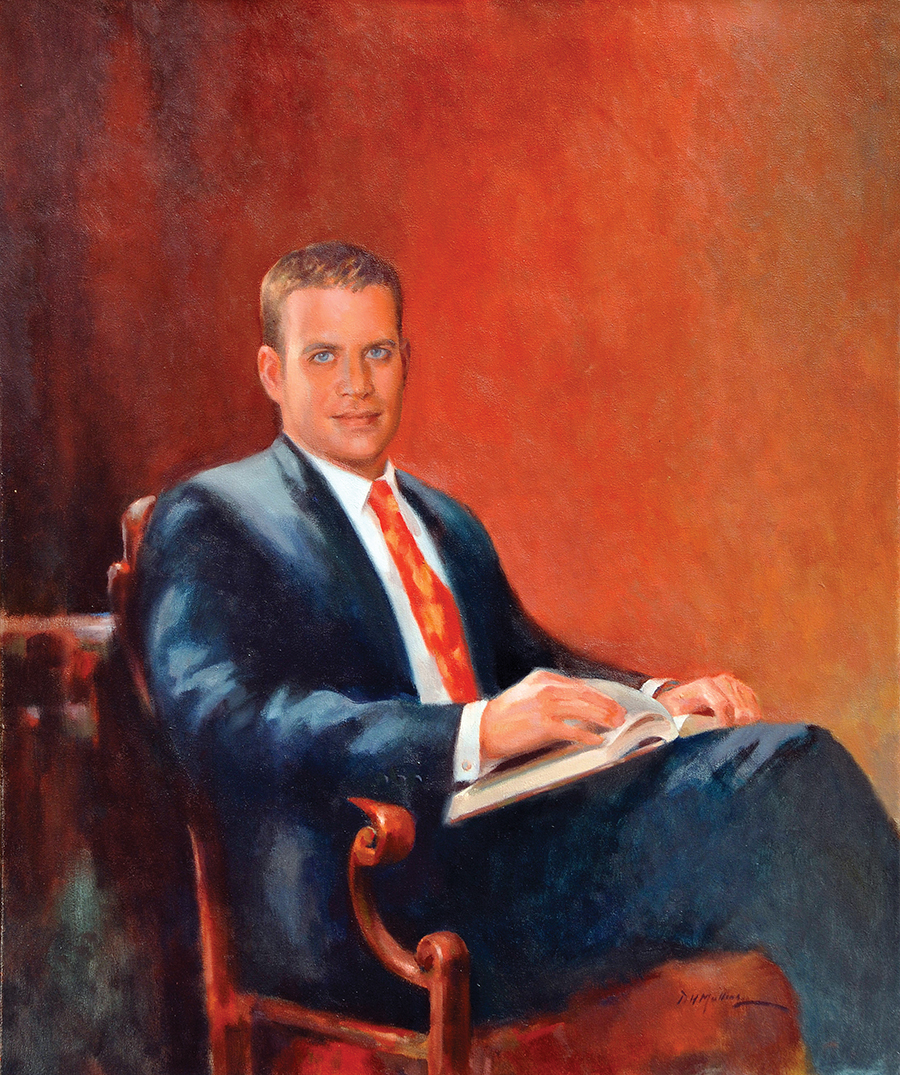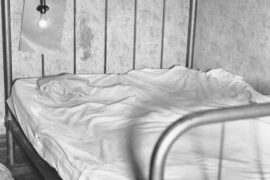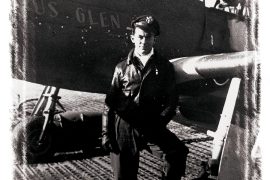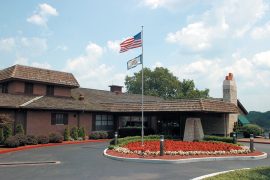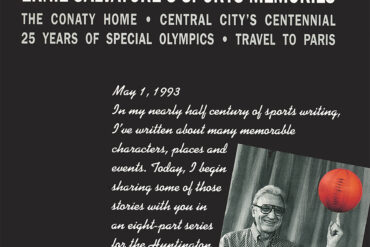The attacks of Sept. 11, 2001, may have taken the life of Huntington’s own Paul Ambrose, but the inspiring legacy the young physician left behind lives on across America.
By Jack Houvouras
HQ 75 | AUTUMN 2011
On the morning of Sept. 11, 2001, at 7:52 a.m., Dr. Paul Ambrose, senior clinical adviser for the Office of the Surgeon General in Washington, D.C., boarded American Airlines Flight 77 bound for Los Angeles. Thirty-five minutes into his flight, the plane passed over Huntington, W.Va., Paul’s beloved hometown, when hijackers overtook the cockpit and turned the plane east toward the nation’s capital. At 9:37 a.m. the plane crashed into the western side of the Pentagon, killing all 64 people on board as well as 125 workers at the United States Department of Defense.
At the same time, thick black smoke was billowing across the clear blue skies of New York City after two commercial airplanes slammed into the towers of the World Trade Center. America would soon learn it was under attack, and the nation would never be the same again.
Life would never be the same again for Ken and Sharon Ambrose, Paul’s parents, Bianca Angelino, his fiancée, or the hundreds of people who came to know and love the charismatic doctor who was just 32 years old when he perished. While his death was a tragic loss to those who knew him, it was also a devastating loss for the entire nation. A renowned leader, Paul Ambrose was a healer and a visionary whose life – which had already shown so much greatness – was destined for even more.
The first thing people noticed when they met Paul Ambrose were his striking good looks.
“My first impression of Paul was that he was ridiculously handsome,” noted Erin Fuller, who worked with Paul at the American Medical Student Association (AMSA) in Washington, D.C. “But once you got to know him you saw what a great, interesting and fascinating guy he really was.”
Chris Durso, editor of the AMSA magazine, recalled a similar first encounter with Paul over lunch.
“I looked at this guy across the table from me, with his deep blue eyes and chiseled cheekbones and cool clothes, and I prepared to write him off,” Durso said. “By the end of the meal, after Paul had intelligently touched on his experiences hiking through South America, on the need for a more cogent public health infrastructure and on the writings of Hunter S. Thompson, I felt chagrined. As anyone who knew him can tell you, Paul was the real deal.”
Indeed there was much more to Paul Ambrose than meets the eye. Incandescently brilliant, engaging, caring and driven, he was determined to make a difference in America and was well on his way to doing so. He had already garnered the attention of former U.S. Surgeon General C. Everett Koop who took him under his wing and began mentoring him. Dr. Koop and many of his peers saw greatness in the young doctor from Huntington and predicted that Paul was destined to become, among other things, the youngest surgeon general in our nation’s history.

He was born Paul Wesley Ambrose on Dec. 26, 1968. The second child of Ken and Sharon Ambrose, he was described by his parents and teachers as inquisitive and extremely outgoing.
“He never knew a stranger,” said Sharon, who was the vice president and chief operating officer at St. Mary’s Medical Center when Paul died. “He was a very happy child, always smiling with those blue eyes.”
His father Ken, a respected professor of sociology at Marshall University, described his son as adventurous and always willing to try new things.
“At the age of 5, Paul climbed the ladder at a local pool on his own and leapt off the high dive,” Ken said. “That, in essence, was Paul.”
He played numerous sports growing up, including Little League baseball with his older brother Scott. While Paul continued to love sports throughout his high school years, Scott was drawn to music and eventually formed his own band.
“Paul was always so supportive of Scott,” Sharon said. “He’d invite his friends over to listen to Scott’s band play.”
But in 1998, the Ambrose family was rocked when, without warning, they lost Scott to a pulmonary embolism. Scott, who was just 31 at the time, left behind a wife and daughter as well as his parents and brother.
“Paul was there for us through that whole experience,” Sharon recalled. “He was so concerned about us and about Scott’s family. From that point on, Paul made a point to always let us know where he was and how he was doing.”
After graduating from Barboursville High School, where he was class president, Paul enrolled at Marshall University. He graduated magna cum laude in 1991 with a dual major in biological sciences and Spanish. Following his junior year, Paul applied for early admission to Marshall University’s School of Medicine and was accepted. He quickly formed a strong bond with one of his professors, Dr. Robert Walker, who was a pioneer in providing health care to underserved areas throughout rural Appalachia.
“I’m not sure I’ve ever seen anything like Paul’s combination of personality, concern for positive events and dedication to being a physician,” said Dr. Walker, chairman of the Department of Family and Community Health at the time. “It’s every teacher’s greatest dream to have a student who gets it – and sometimes they get it even better than you give it. That was Paul. He was so excited about what he was doing, so in love with what he was doing, that he made you feel good just to be around him.”
During medical school, Paul asked for and was given permission to spend a year at the University of Salamanca in Spain, where he studied the country’s health care system. He remains the only student to ever study abroad while attending medical school at Marshall. The experience was invaluable to Paul as he absorbed the new culture and learned to speak the language fluently; it left him with a love for Spanish culture and a passion for its people. As many of his teachers would later say, Paul was not a typical student. He possessed a think-outside-the-box approach to both his life and his schooling.
“From the beginning, Paul was interested in the larger picture,” recalled his father Ken. “He was interested in public health and health care policy. He wanted to improve the conditions for the larger population as well as for the individual patient.”
Upon graduating from medical school in 1995, Paul forged his own path once again when he elected to forego his residency and instead work for a year as the national director of legislative affairs for the American Medical Student Association (AMSA) in Washington, D.C. As part of his job, he worked on bills that fostered reform in the health care industry.
After his year working in Washington, Paul began his residency at Dartmouth Medical School in Hanover, N.H. It was there that he caught the attention of Dr. C. Everett Koop, former U.S. surgeon general and Dartmouth faculty member.

Dr. Koop was impressed with the young man’s intelligence, energy and passion to ameliorate health care in America.
“His career, like my own, was in public health, which led to my becoming his mentor,” Dr. Koop explained. “Paul had the ability to put as much effort into four or five projects simultaneously with as much zeal as you and I would put into one. He was sensitive, self-giving, the very model of what a physician should be to his patients.”
While at Dartmouth, Paul was appointed by the secretary of Health and Human Services to serve as the only resident on the congressional advisory committee of the Council on Graduate Medical Education (COGME).
“I recall a shining, articulate and intelligent young man whose insight and remarks competed brilliantly with other members of the committee more senior in years,” noted Dr. Vincent C. Rogers, who served on the committee with Paul. “I confess I looked upon him with admiration, envy even, as I contemplated his potential.”
Yet, no matter how busy Paul was, he always made time for fitness in his life. He enjoyed running, weight training and tae kwon do while at Marshall. At Dartmouth, he took up skiing and snowboarding. He began rock climbing during his time in Washington, D.C. Both his mind and body were always in tune and operating at full capacity.
After completing his residency and at the urging of Dr. Koop, Paul applied for and was awarded a fellowship at Harvard University in the School of Public Health. While there, he studied the cancer treatment of women in rural West Virginia as one of his projects. He graduated from Harvard in 2000 with a master’s degree in public health.
Following the completion of his studies at Harvard, Paul returned to Washington when he was awarded the Luther Terry Fellowship, a two-year appointment that saw him serve as the senior clinical adviser to U.S. Surgeon General David Satcher. The two worked closely on various projects, including the growing problem of obesity in America. Paul was the senior editor of The Surgeon General’s Call to Action to Prevent and Decrease Overweight and Obesity, released in early 2001. Among its objectives were ensuring daily, quality physical education for all public school students, building physical activity into regular routines and playtime for children and their families and creating more opportunities for physical activity at work sites. The Call to Action recommended the adoption of policies specifying that all foods and beverages available at school contribute toward eating patterns consistent with the Dietary Guidelines for Americans and provide more food options that are low in fat, calories and sugar. In many regards Paul was a visionary, recognizing America’s growing obesity problem nine years before Jamie Oliver’s Food Revolution aired on ABC. For all his efforts, the Call to Action was dedicated to Paul posthumously.
On the weekends Paul worked as a family doctor at a private practice in Arlington, Va., that served a large number of Spanish-speaking patients. He spent so much time with each patient that it often put him behind schedule. People waiting long periods of time to see the young doctor inevitably grew irritated. But, as his former medical assistant recalled, once they met the handsome, brown-haired, blue-eyed doctor who spoke fluent Spanish, their anger vanished.
“His female patients would actually get dressed up to come see him,” his assistant recalled. “It was really a sight.”

During a medical conference in Washington, D.C., in 2000, Paul met a striking young woman who would change his life. Her name was Bianca Angelino, and she was a student at Western Michigan University studying biomedical sciences. However, it wasn’t the self-assured young doctor who made the first move; instead it was Bianca.
“He was standing in an exhibit hall talking to my best friend,” Bianca recalled, “and I said to myself, ‘Who’s this cute guy?’ So I ran up and introduced myself.”
The two stayed in touch after the conference, and eventually Bianca invited Paul to speak at a seminar she was hosting at Western Michigan. He agreed to the trip, saying he had already planned to be in Chicago that weekend and would simply rent a car and drive to Kalamazoo. Later, Bianca heard a surprising confession that remains one of her fondest memories.
“Three months after the seminar, I flew to Boston to see him,” she said. “The morning I was supposed to fly back to Michigan, he told me, ‘I never had any business in Chicago.’ I knew then we had a special connection.”
Bianca eventually moved to Washington, D.C., to be with Paul. During a party on July 4, 2001, he announced the two were getting married.
“We had talked about getting married before that, but nothing definitive,” Bianca explained. “So I said, ‘Oh, we are? Does this mean we’re engaged?’ And he said, ‘Yeah!’ It was totally Paul, though – the fact that he was so excited about something that he had to share it, the fact that it was all so spontaneous. Two weeks later he purchased a ring, got down on one knee and formally proposed.”
Bianca said there were numerous things she loved about Paul, including his ability to dazzle.
“He could be an hour late for a meeting, and everyone in the room would be irritated,” she said. “But then he would walk in with this bountiful energy and smile and be 100 percent on top of his presentation, and people would forget in an instant that he was late. He had this ability to just knock your socks off.”
“Even so,” she continued, “his intention wasn’t to charm. He always engaged people in a very sincere and authentic way. Unless you met him, it’s hard to convey how charming, how striking, how intoxicating his personality was. He was so amazing.”
Bianca described her time with Paul as a nonstop adventure.
“He would wake up in the morning and blast rock-and-roll music and start dancing around the living room. That basically sums it up,” she laughed. “He was kind, thoughtful and generous, and he always made time for me, as well as his family and friends.”
While Paul may have appeared perfect, Bianca said he was indeed human.
“He couldn’t stand the fact that he wasn’t quite 6 feet tall, and he worried about losing his hair one day. And believe it or not, he was insecure about the impact he was making. He never thought he was doing enough. He was always trying to reach more people and develop new ideas. He was always pushing himself to do more.”
On September 10, the night before Paul was scheduled to fly to Los Angeles to attend a conference on youth obesity prevention, he made arrangements to take Bianca to dinner at Taberna Del Alabardero, the finest Spanish restaurant in Washington.
“It was special because Paul loved Spain and we were planning to get married in Madrid,” Bianca said. “We had this magical dinner, never knowing it would be our last.”
The next morning Paul awoke early to pack for his flight to Los Angeles. The last thing he said to his fiancée before boarding the plane was, “I don’t want to leave. I miss you already.”
On Tuesday, Sept. 11, 2001, America awoke to the news that a plane had accidentally crashed into the World Trade Center’s north tower at 8:46 a.m. At first it was reported that it was a small plane, but when a second plane, this time a commercial airliner, slammed into the south tower just 17 minutes later, the nation knew it was under attack by terrorists.
Ken and Sharon Ambrose were in the midst of what they thought was a typical morning when they first heard the news of the attacks.
“We received a phone call from Bianca, who told us that Paul had flown out of Dulles International Airport earlier in the morning, but she thought he was fine because his flight had left so early,” Sharon recalled.
Moments later, American Airlines Flight 77 crashed into the Pentagon. When it was reported that the plane had originated from Dulles, Bianca grew nervous. She began calling Paul’s cell phone, but it kept going to voicemail.
Shortly before noon, Sharon received a call at work that confirmed any parent’s worst fear – her son had been aboard the plane that crashed into the Pentagon, and there were no survivors.
“It was just hard to believe,” Sharon said. “Paul spent his entire life helping and befriending people. But there are people in the world just trying to destroy each other. Just seeing that was so unreal. You try to get through it day by day, but it’s not easy. When Scott passed away, people would say, ‘It’s not right when a child dies before the parents.’ And you think the worst has happened, and you try to recoup and pick up from there…”
“…and then you have the loss of another child,” continued Ken. “It’s hard to believe that it’s happening to you again. The way the news coverage was, you couldn’t get away from it. It was everywhere.”

On Sept. 23, 2001, a memorial service was held for Paul Wesley Ambrose at the Marshall University Fine and Performing Arts Center. Among the hundreds in attendance were Gov. Bob Wise, Sen. Jay Rockefeller, MU President Dan Angel and numerous colleagues from across the country. One by one, friends walked to the podium and shared their fondest memories of a fallen American son.
“His was a promising life cut short by this tragedy,” said Dr. Kenneth Moritsugu, assistant U.S. surgeon general at the time. “He wanted to help our nation improve our health. He has made a difference for America.”
“There simply is nobody who has done the things that Paul did by the age of 32,” said Dr. Adam Wooten, Paul’s best friend. “He was a great friend. He worked over 100 hours a week, but anytime you needed him, he was there for you. Just recently I called him on his cell phone seeking advice. When I called he was in the middle of a conference call in his office with other physicians. I expected him to say, ‘Can I call you back?’ But that’s not what he did. Paul put the others on hold and said, ‘What do you need?’”
“He was a champion for social change and a champion for the needs of the poor and underserved,” said Dr. Donald Kollisch, Paul’s colleague at Dartmouth Medical School. “Just short of frenetic, Paul had more energy and creativity than any five of us. He defied limitation. He was physical, he was cerebral, he was compassionate and he was nonstop.”
C. Everett Koop sent a letter, read aloud during the service, which said in part: “Though I’ve only known Paul for five years, he soon became as close as a son. He was most blessed with skills and competencies that would take him to great heights in public service. I have no doubt that Paul would have gone on to roles such as surgeon general of the United States, then a cabinet position of Health and Human Services, then a senior delegate to the World Health Organization and eventually the dean of a major School of Public Health. Paul and some of his colleagues saw the need for a resident physician leadership conference in the Koop Institute at Dartmouth and helped launch it. Without discussing it with me, they called this endeavor the C. Everett Koop Resident Physician Leadership Symposium. I want to share with you my desire and plan that this is to be renamed the Paul Ambrose Resident Physician Leadership Symposium.”
“I’m proud that Paul was from here,” said Dr. Robert Walker. “Paul was ours. He was Huntington’s, and he was Barboursville’s, and he was Marshall’s and he was West Virginia’s. And because he was ours, a lot of the tragedy and some of the joys are ours. Paul’s projects made the world better. It’s hard to know what to do with all this grief, but I have to do something. So I’m going to propose a project – one of Paul’s projects. Anyone can do it, and this is how it works: Whatever I do that’s good, I’m going to do it better. However much I care, I’m going to care more. Goodbye, Paul.”
At the conclusion of the guests’ remarks, Ken, Sharon and Bianca walked to the podium together. Ken spoke softly for the three when he said, “When he came into our home, he brought a joy and a happiness that rounded out our small family. His beautiful eyes reflected the beautiful person he was inside. During our last vacation, we went fishing off the coast of North Carolina. We chartered a small boat, and the captain asked, ‘Do you want to stay in the safe area next to shore and catch some smaller fish, or do you want to go out 30 miles to get the big ones?’ And Paul said, ‘Let’s go for it!’ Well, he caught the big fish he was after, and then, standing in the back of the boat, he said, ‘What a beautiful day, what a beautiful time. Life doesn’t get any better than this.’ He enjoyed life. He enjoyed every moment of his life. His challenge to his peers and to his friends and to his family was this: ‘Whatever we’re doing, let’s do it better.’”
At the end of the service, Huntington native and Broadway star Mark McVey sang Bring Him Home from the musical Les Miserables.
While the death of Paul Ambrose left a void in the lives of those he touched, his legacy lives on. In the last 10 years numerous awards, scholarships and symposiums have been established to inspire others in the medical field to carry on the important work he started. The following is a list of distinctions that bear his name:
• Paul Ambrose Political Leadership Institute at the American Medical Student Association
• The American Medical Student Association’s Lifetime Achievement Award for Distinguished Service
• The Paul Ambrose Scholars Program at the Association for Prevention Teaching & Research
• The American Medical Association’s Paul Ambrose Award For Leadership Among Resident Physicians
• The Dr. Paul W. Ambrose Memorial Award at the Marshall University School of Medicine
• The Dr. Paul W. Ambrose Memorial Fund scholarship at the Joan C. Edwards School of Medicine
• The Surgeon General’s Medal of Honor
• The Paul Wesley Ambrose Health Policy Program, a fellowship program at the Marshall University School of Medicine
• The Paul Ambrose Fellowship at Dartmouth Medical School
• The Paul Ambrose Physician Resident Leadership Symposium at Dartmouth Medical School
Perhaps the one thing that would have pleased Paul the most is a project currently underway in his hometown. The Paul Ambrose Trail for Health, or PATH, is a 26-mile bicycle and pedestrian trail system for the people of Huntington. The Rahall Transportation Institute Foundation, in association with the City of Huntington and various community members, designed the trail system as an alternate means of transportation. But more importantly, the PATH is vital in Huntington’s ongoing efforts to provide healthy recreational opportunities for its citizens.
“Paul certainly would have loved all the healthy lifestyle initiatives named in his honor, especially the PATH,” noted Bianca. “He was such an active, fit and healthy person. He didn’t watch TV; he read. When he wasn’t reading, he was writing. When he wasn’t writing, he was working. And when he wasn’t working, he was exercising.”
“I think it’s a positive living memorial to Paul,” said Sharon about the PATH. “It will keep going and benefit everyone.”
The 10th anniversary of the September 11 attacks is a time for us to reflect on a dark day in our nation’s history that claimed the lives of 3,000 people. Sadly, one of those lost was Dr. Paul Ambrose – one of Huntington’s, and indeed the nation’s, most promising sons. While the legacy he left behind is inspiring and imbues us with a sense of hope for the future, one can’t help but pause and wonder what might have been had he not boarded that plane.
“Once, when we were chatting about his career’s next steps, I asked Paul, ‘Where do you see yourself in 10 years?’” recalled Dr. Koop. “He replied straightforwardly, ‘Serving as secretary of health in my home state of West Virginia.’ I then wrote to Senator Jay Rockefeller and told him of my affection and admiration for Paul and said, ‘You should have Paul Ambrose in your sights.’”

In his short life, Paul changed the way many of our nation’s leaders look at health care, and he convinced all of us that we can do more. Programs bearing his name focus on such vital issues as early childhood education, exercise and healthy eating guidelines. There are initiatives on preventative medicine and the importance of taking part in the political process to effectuate positive change in our health care system. Medical students and physicians are asked to do more than simply practice medicine; they are encouraged to take on projects that improve health in their communities, travel to Third World countries to heal the sick and dedicate a portion of their time to treating the underserved.
“His goal was to build more social consciousness into medicine and help physicians become leaders,” said Ken.
Today, Ken and Sharon Ambrose continue to struggle with their grief.
“I think the future is what we miss the most,” said Sharon. “We miss his future, our future with him, all the things he was going to do, the family he would have had…”
“…grandchildren, and all those things you anticipate,” continued Ken. “The future is not there now. We’re happy for the time we had with him and proud of his accomplishments, but we just wish we could have had more time with him.”
To help cope with their loss, the Ambroses have taken up their son’s fight by getting involved in projects that focus on public health issues. While the pain never goes away, it is tempered by a wealth of warm memories.
“Being around him was always just plain fun,” said Sharon. “With Paul, you never knew what was coming next. He always included us in everything. Even when we’d go up and visit him, he’d take us to parties with him. He was so caring.”
“The thing I miss most is his personality, his spirit,” said Ken. “You were always included. Whatever the adventure was, it was always good.”

There were so many qualities that made Paul special, not the least of which were the hundreds of friendships he forged with people from all walks of life. From physicians to senators to janitors, he was a man who kept his friends and maintained his relationships. He never outgrew people.
The life of Paul Ambrose is one we can all look to with great pride. He lived more in his 32 years than most people live in an entire lifetime. He was a caring son, devoted fiancé and loyal friend. He was a dedicated physician, impassioned leader and true visionary. And, as Dr. Robert Walker expressed so eloquently, he was ours.

